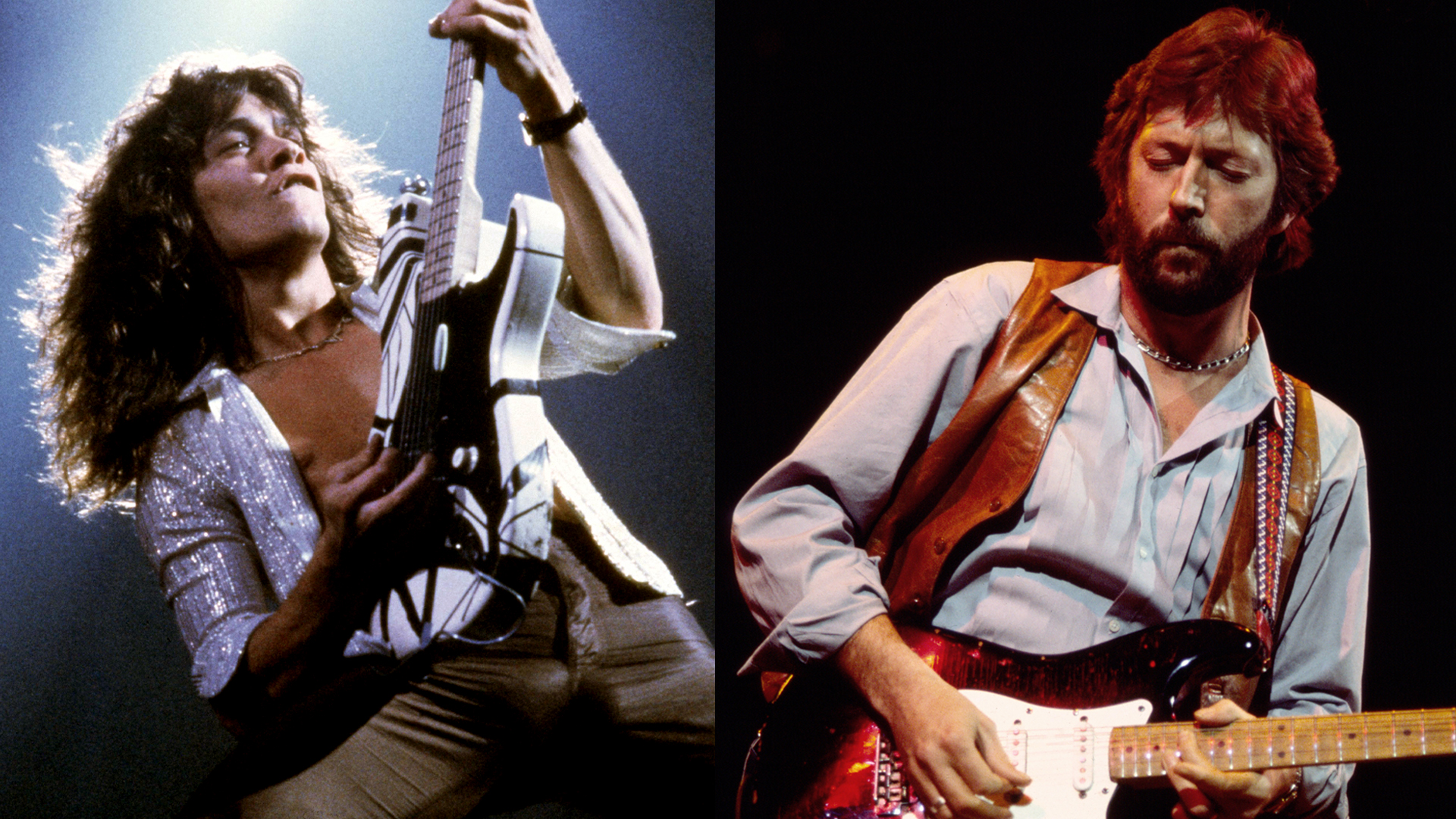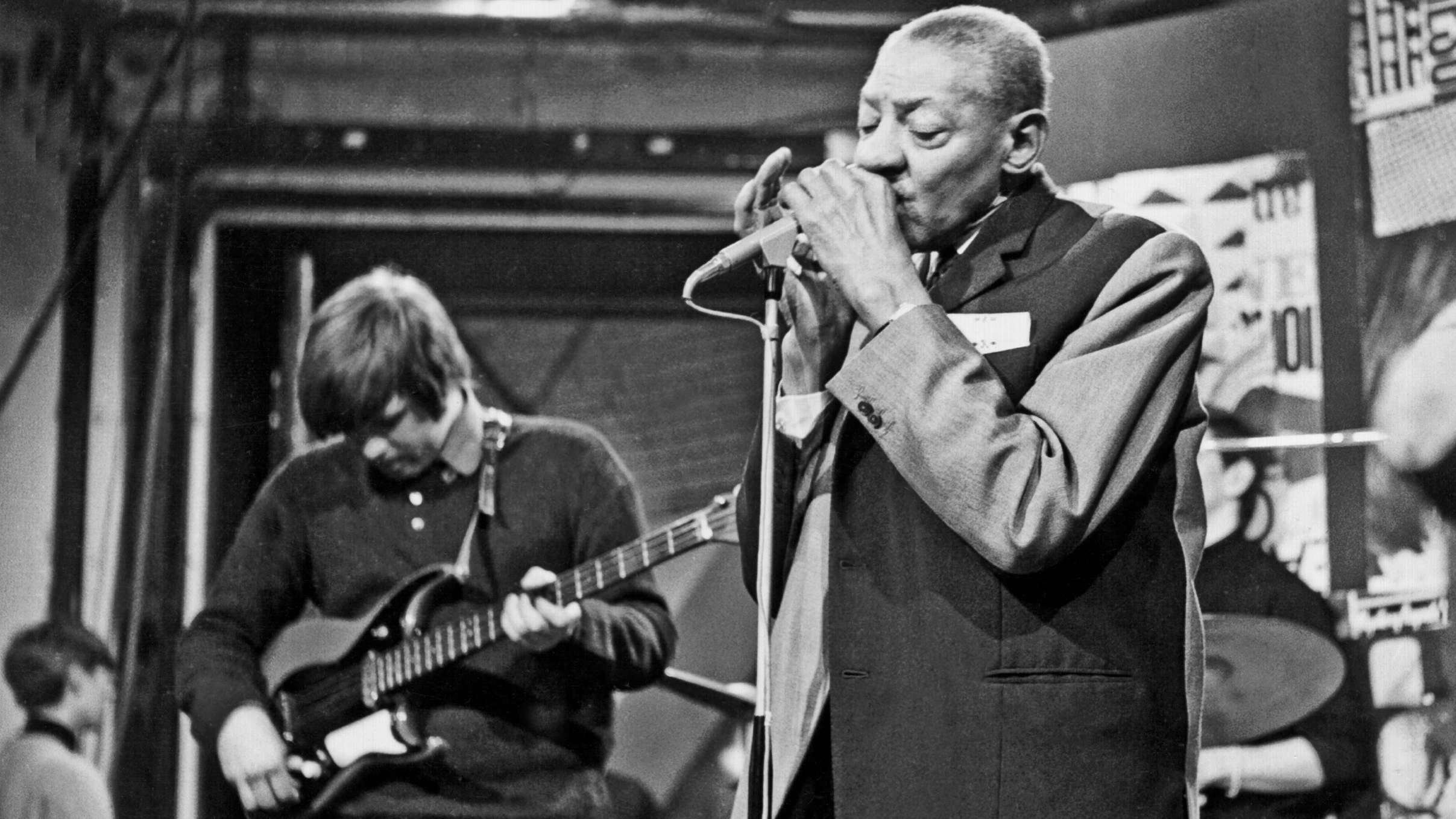“If he was that tuned into me and missed that point, then he missed the whole point.” Eric Clapton on the one thing Eddie Van Halen didn’t understand about playing the blues
History says Clapton insulted Van Halen. Taken within context, his comments were part of a wider discussion about understanding the blues

The old adage goes that you should never meet your heroes; it’s sure to bring only disappointment.
But the friendship between Eddie Van Halen and Eric Clapton reveals another useful proverb about heroes: Never piss them off; they might tell you what they really think of you.
Although he’s an icon to millions of guitarists today, Eddie Van Halen was relatively unknown when Jas Obrecht interviewed him for Guitar Player’s November 1978 issue. Van Halen, the self-titled debut album from his band, had come out the previous February, but no one had interviewed the guitarist before Obrecht, who delivered essential insights into Eddie’s background, techniques and musical influences.
Among the first things the public ever learned about Eddie Van Halen was the key influence behind his furiously fast, technically precise but melodic electric guitar work.
“I’d say the main one, believe it or not, was Eric Clapton. I mean, I know I don’t sound like him.”
It was a surprising revelation, given that his style was much more raw and aggressive, as well as technical — “more like Hendrix or Blackmore,” Obrecht suggested.
“Yeah, I know,” Eddie replied. “I don’t know why, because Hendrix I like, but I was never into him like I was Clapton.
Get The Pick Newsletter
All the latest guitar news, interviews, lessons, reviews, deals and more, direct to your inbox!
“And Clapton, man, I know every fuckin’ solo he ever played, note for note, still to this day.
“I used to sit down and learn that stuff note for note [off the record] The live stuff, like ’Spoonful,’ ‘I’m So Glad’ live — all that stuff.”
As Van Halen’s fame grew, Eddie and Clapton eventually crossed paths, hung out and formed a friendly relationship. Although there seemed to be not a drop of blues in Eddie’s highly technical shred guitar work, Clapton — who by this point was deeply wedded to the blues and Fender Stratocasters — suggested there was something innate about the younger guitarist’s sensibilities.
"If Eddie Van Halen likes the way I play, then assumedly, he must like what I liked,” he told Guitar Player in our July 1985 issue. “But if he can recognize all of that and still do what he does, then we have to accept that he's on to something that we're not really clear about. Because he couldn't be doing what he does and recognize Robert Johnson without there being something valid going on.”
It was high praise — an affirmation from an older, established guitar hero that Eddie’s transformational shred guitar work was rooted in the same bedrock from which Clapton’s own muscular and fluidly melodic blues-rock style came.
He couldn't be doing what he does and recognize Robert Johnson without there being something valid going on."
— Eric Clapton, Guitar Player, July 1985
“He is very fast, and to my ears, a lot of the time he kind of goes over the top,” Clapton continued. “But that's because I'm a more simple player. Maybe I would play like that if I had the technique.
“I’ve heard that he slowed down records of mine to learn the solos. That's dedication! I don't know quite how to respond to that.”
Clapton’s comments might seem like a whole-hearted endorsement of Van Halen and his devotion to the blues. But below the surface, Clapton was harboring profound doubts about Eddie’s understanding of the genre. Roughly two years earlier, he’d been incensed after hearing a tribute song on Brian May’s 1983 Star Fleet Project mini-album. Titled “Blues Breaker,” the nearly 13-minute track featured May and Van Halen going to town on a medium-tempo blues workout that was tagged “Dedicated to EC”
Clapton wasn’t at all pleased by what he heard. While he’d held his tongue when speaking with Guitar Player in 1985, he vented his feelings when interviewed by Musician magazine shorty after, in 1986.
“It was so horrible, and they dedicated it to me,” he said. “They sent me a copy, and I put it on expecting something, and, you know, I was almost insulted that they should send this to me because they both… they can't play! They took turns to play solos and just went head at it with everything they knew. And there was no dynamics, no build up, no sensitivity. I was very disappointed.
“The thing is,” he added, “if [Van Halen] wants to play blues, he has to look at it as a style. It's got rules. It's like Japanese Kabuki theater or something. It's got certain things which you do and other things which you don't do.”
More personal, however, were his comments about Eddie’s obsession with his music. Contrary to his earlier statements to Guitar Player, Clapton felt that, despite studying his work so closely, Eddie had somehow never grasped the essence of the music from which Clapton himself drew.
If he was that tuned into me and missed that point, then he missed the whole point.”
— Eric Clapton, Musician, November 1986
“Eddie Van Halen went over the top,” he said. “It's crazy for him to have learned that much from me. I mean, he could have just been aware of what I was doing and then said, ‘Oh yeah, well, that's a bit like Buddy Guy,’ or, ‘That's a bit like so, and so.’ Put it all in perspective. To get obsessive about one person…
“If he was that tuned into me and missed that point, then he missed the whole point.”
Harsh as Clapton’s comments were, what tends to get overlooked were his negative appraisals of his own youthful attitude toward blues stated elsewhere in the interview. He cited his ignorance of Sonny Boy Williamson’s blues back when Clapton was a member of the Yardbirds. Clapton says he thought every 12-bar blues was the same.
“But every 12-bar blues is different,” he told Musician. “Sonny Boy Williamson would have an intro on certain songs, and if you didn't know that, then he would be disgusted with you.
“And I know this from experience because he was disgusted with me, because that was my attitude.”

Taken within context, Clapton’s comments are a critique on what guitarists tend to get wrong about playing the blues, and they're spoken from the experience of someone who made the same mistakes. Clapton was playing the mentor trying to help his student avoid his errors.
But the full extent of his treatise was missed if you focused solely on his comments about “Blues Breaker.” Eddie did. He was hurt, but he still hoped to remain friends with Clapton. Some years after, at a party in New York City, Eddie attempted to patch things up. He was reportedly drunk. Clapton — newly sober — came off as dismissive. Eddie was furious. “Forget that teabag,” he said.
That ballsack.
Eddie was still hurt a few years later when he sat down for an interview conducted by Dweezil Zappa in Guitar Player's March 1995 issue. Nearly 20 years after he praised Clapton in our pages, Ed offered a new assessment of his hero.
“I grew up on Clapton, but — don't hate me, Eric! — it's like he doesn't do that anymore. Now when he solos, to me it's like he's pissing up a rope. Excuse my French.
I grew up on Clapton, but — don't hate me, Eric! — it's like he doesn't do that any more. Now when he solos, to me it's like he's pissing up a rope."
— Eddie Van Halen
“Listen to his early solos, all the Cream stuff like ‘Sunshine of Your Love.’” Here Eddie played a flurry of Clapton licks. “The shit he does… he spoke when he played.
“And, like, ‘Born Under a Bad Sign’ — the end of that solo was great. After having grown up on that, I thought that every time I solo I should make it like that too.”
Clapton might have agreed with some of that, including the part about pissing up a rope. At the end of his Musician interview, he offered his own assessment of his soloing.
“I always overplay,” he said. “Whenever I listen back to stuff, I'm always disappointed. I mean, I hate listening to cassettes of shows. I listen sometimes, and think I could have done three notes to those 10. Just halved it and made it more meaningful. But it's very difficult.”
“It’s very difficult” — Van Halen and Clapton might have built something from that small patch of common understanding. They never spoke again.
Christopher Scapelliti is editor-in-chief of GuitarPlayer.com and the former editor of Guitar Player, the world’s longest-running guitar magazine, founded in 1967. In his extensive career, he has authored in-depth interviews with such guitarists as Pete Townshend, Slash, Billy Corgan, Jack White, Elvis Costello and Todd Rundgren, and audio professionals including Beatles engineers Geoff Emerick and Ken Scott. He is the co-author of Guitar Aficionado: The Collections: The Most Famous, Rare, and Valuable Guitars in the World, a founding editor of Guitar Aficionado magazine, and a former editor with Guitar World, Guitar for the Practicing Musician and Maximum Guitar. Apart from guitars, he maintains a collection of more than 30 vintage analog synthesizers.
